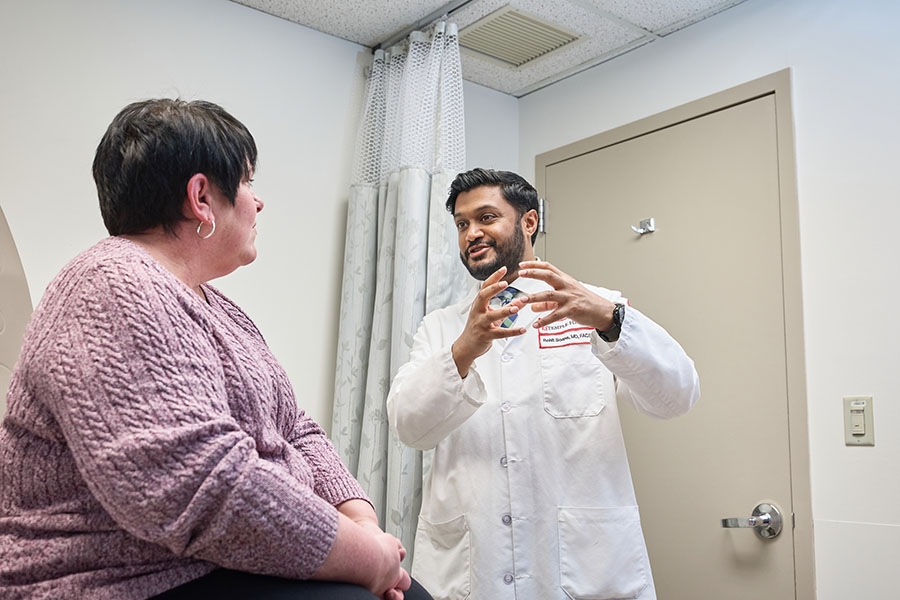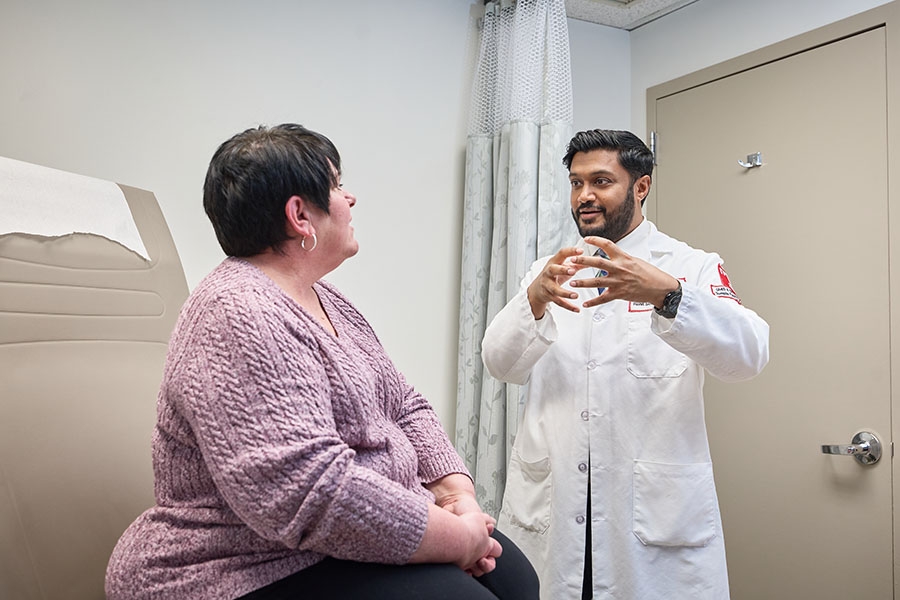The needs of weight-loss surgery patients are unique, and the best results occur when a supportive and encouraging weight-loss team is behind you. The multidisciplinary Temple Bariatric team guides you through the entire process, from working with you to design just the right plan, to helping you navigate the ins and outs of surgery and long-term weight management. Learn about the pathway to success with the Temple Bariatric Program.
Surgery Process
Prior to undergoing weight-loss surgery at Temple University Hospital or Temple University Hospital – Jeanes Campus, you’ll meet with a bariatric surgeon for assessment. Together, you and your surgeon will consider your best surgical options, either Roux-en-Y gastric bypass or gastric sleeve. You’ll also meet with members of the Temple weight-loss team, who will provide education and evaluation to help you prepare for surgery. This is a time when you and your team will ensure bariatric surgery is right for you. The time from initial consultation to surgery varies.
Your team includes board-certified surgeons, registered dietitians, licensed psychologists, specially trained nurses and administrative support.
Download our bariatric surgery checklist >
Weight-Loss Education
The Temple Bariatric Program offers educational classes to help you understand diet information, weight-loss surgery options, risks and benefits of weight-loss surgery, and what to expect during and after your hospital stay.
To find out if bariatric surgery is right for you, attend a live virtual informational seminar on Zoom. Or, sign up for our on-demand seminar to watch whenever it's convenient for you.
Nutritional Consultation
A registered dietitian will assess your nutrition and provide customized diet instruction. During this session your weight will be recorded. Be prepared to discuss your weight and diet history, as well as your eating patterns. Bring any supplements you are taking and show them to your dietitian. This is the ideal time to ask questions, so be sure to read your handbook and write down questions before the meeting.
Evaluations
Your assessment also includes tests to evaluate your blood, gastrointestinal (GI) system, heart and lungs. Your bariatric surgeon will determine the type of tests you will have. If you need help scheduling any tests, our bariatric team is here to help.
Steps Toward a Successful Procedure
You will be required to lose weight before your procedure. You can start by following your dietitian’s recommendations during the assessment and consultation period. This will help your bariatric surgical team perform your procedure as safely as possible.
The length of time you will stay in the hospital after your surgery differs for everyone. Typically, patients go home the day after surgery.
Your Diet in the Weeks After Surgery
Immediately after surgery, you will require an all-liquid diet. It’s especially important to avoid any drinks that contain sugar, caffeine or carbonation. Soda and coffee are strictly prohibited during this time. As your body adjusts to your new normal, you will slowly start to build on your liquid diet. First, you’ll add protein-based liquids, followed by pureed foods and finally, you’ll add in foods with texture. You will be on a regular, healthy diet at week nine.
More information about diet after surgery.
Exercise After Surgery
Following surgery, you may start an exercise program once you have been cleared by your surgeon or bariatric surgery physician extender. You may receive a referral to a physical therapist or exercise physiologist, or you may participate in an independent, self-directed exercise program with guidance from the Temple bariatric team. Recommendations for physical activity following surgery may include:
During the First 6 Months After Bariatric Surgery
-
Moderate Aerobic Exercise Activities
-
3–5 days per week
-
At least 30 minutes of continuous aerobic activity per session
-
-
Strength Training Activities
-
In addition to aerobic exercise regimen
-
Beyond 6 Months After Bariatric Surgery
-
Moderate to Intense Aerobic Exercise Activities
-
At least 4 days per week
-
At least 45 minutes of continuous aerobic activity per session
-
-
Strength Training Activities
-
In addition to aerobic exercise regimen
-
Because weight-loss surgery is designed to restrict the amount of food you can eat at one time, it’s important to plan for the long term. Our registered dietitians help you develop a customized diet plan that includes a variety of nutritious foods, and vitamin, mineral and protein supplements. Nutritious foods will not only help your incision heal initially, they will also help you achieve your health goals. The following are some tips to help you manage nutrition problems after surgery:
Supplement with Vitamins & Minerals
Your registered dietitian will work with you to supplement your diet with vitamins and minerals to avoid nutrient deficiencies that are common after bariatric and metabolic surgery. A bariatric complete multivitamin with iron containing Thiamine (B1) and Vitamin B12 and calcium is especially important, as it helps prevent osteoporosis and anemia. Talk to your dietitian before starting any supplements.
Pace Yourself at Mealtime
Following weight-loss surgery, pay special attention to your body’s signals. You will need to stop eating as soon as you feel full. Start by learning to chew and eat slowly. If you do continue to eat, you may experience nausea and vomiting. Even a single bite can make a difference.
Weight-loss surgery is life-changing in many ways. Along with your physical transformation, you’ll learn to adjust to a number of other changes in your everyday life. Your eating and drinking habits will evolve, and you’ll experience physical activity in a whole new way. You’ll probably notice challenges with your interpersonal relationships, mental health and sense of well-being, too. All of this is normal, and part of the process.
Weight-loss surgery can help you reach your goals, but it’s just one part of your strategy. Take advantage of your multidisciplinary Temple weight-loss team to help you meet your challenges, and stick with your plan:
-
Work with your dietitian and bariatric surgeon to design a diet plan that fits your lifestyle and needs.
-
Get your blood work done as scheduled by your bariatric team to ensure your body is absorbing nutrients.
-
Follow up with your weight-loss team according to the schedule defined for you — one week after surgery, then at 3, 6, 9, 12, 18 and 24 months, and then finally once per year after that.
-
Check out the resources available to you at the Temple Bariatric Program. Our program includes ongoing diet and lifestyle counseling, education and personal support.






